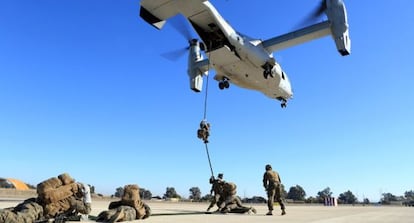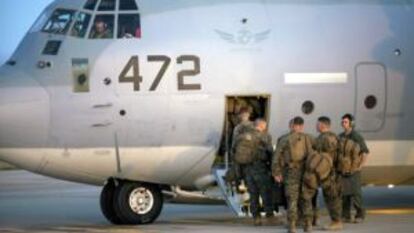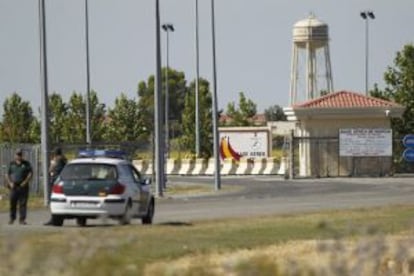Will 2,200 more US Marines prove Morón’s salvation?
Following US-Spain deal, Andalusian airbase may raise the number of stationed troops Locals are wondering how much an increase might help reduce the town’s 31% jobless rate


A large poster of Our Lady of Sorrows flanked by two long strings of garlic presides the entrance to the canteen at the military base in Morón de la Frontera, in Seville province.
Many of owner Manolo Martín’s customers are, in fact, US Marines. But he has not yielded an inch of wall to them: all available space is covered with photographs of bullfighters and religious imagery, plus the odd picture of a plane.
“I’m a real dyed-in-the-wool Sevillano,” he explains. “I like bulls, the [Seville] fair and the Rocío [annual pilgrimage], and I extend that to these guys.”
I used to be stationed on a ship before this. This place is amazing!”
US Marine Eric Greeks
At noon, a group of very tall Americans sits down at a table and orders a huge bowl of salmorejo, an Andalusian tomato-based dish that is similar to gazpacho.
“They love our food; the Spanish omelettes sell fast,” adds Martín proudly. The tortilla de patatas sitting atop the bar counter was made with 20 eggs and its diameter is the same as a waiter’s tray.
Martín is probably one of the people who most wholeheartedly welcomed news that Spain and the US have reached a deal to make Morón a permanent base for USAFRICOM, the United States Africa Command, which handles military operations and relations with the continent.
Spanish Congress on Thursday greenlighted the conversion of the temporary deployment into a permanent one, raising the maximum number of US Marines at the base from 850 to 3,000 – 2,200 permanent and 800 temporary troops.
That’s a lot of tortillas.
But it may take more than healthy appetites to boost the local economy. The unemployment rate in Morón (population 28,240) is 31.4 percent, surpassing the Spanish average of 23.8 percent.

“For many years, the airbase was the town’s top employer,” says its Socialist Party Mayor Juan Manuel Rodríguez, who says “a change in the management model” triggered 230 layoffs. Now, olive production has become the main driver of economic growth.
There are 479 Spaniards working for the Americans: 404 for the US Air Force – present in Morón since 1957 – and 75 for the 850 Marines who began arriving in April 2013. Besides that, around 120 employees have temporary contracts, from the ice-cream seller who plies his wares up and down the streets of the airbase – where street signs are written in English and Spanish – to the bowling alley workers. The facilities also include a swimming pool, a baseball field, a supermarket, a library, a church and even a souvenir shop.
The document setting out the terms of the agreement between the Spanish and American defense departments, which EL PAÍS has had access to, does not establish a one-Spanish-worker-for-every-three-US-troops ratio as requested by José Armando Rodríguez, committee president at Vectrus, the company that runs employment at the airbase.
Instead, the text says the United States intends to use Spanish material, workers and equipment for works projects, as long as this is possible under US laws and regulations. It also notes that the US presence “could” lead to additional employment opportunities for the local community.
“No force in the world can guarantee a specific number of contracts, because that depends on the needs of each moment, and the Marines are self-sufficient,” said a spokeswoman at the US Embassy in Madrid. “But doubtless their presence will have a positive impact on the local economy. In the last six months contracts worth €1 million have been signed with 75 Spanish companies.”
Under the deal, the US also commits to a €26.3 million investment in airbase infrastructure.
In any case, there are no immediate plans to bring in new troops in the coming months, explains US Marine Corps Colonel Thomas Savage, 49, the commanding officer of the Special Purpose Marine Air-Ground Task Force at Morón.
“We’ve been authorized to bring up to 2,200, but we don’t know when that is going to happen or whether it’s going to happen at all,” he says, explaining that the deal gives them the flexibility to raise the number of troops “in case we need it to protect US personnel and facilities in Africa.”
The agreement also includes the possibility of having Spanish military observers participate in crisis operations and attaching Spanish liaison officers to US commands.

Unlike most members of the US Air Force, the marines will not rent homes in Morón, but will live at the base instead. A Spanish company is building new barracks for them after securing a €680,600 contract.
And while they will not be spending any money on rent, Colonel Savage says he sends them out on field trips every weekend.
“We spend a lot of money on making them go out – €15,400 a month, according to the embassy. I want them to see Spain, to get to know its culture. I’ve sent them to Seville, to Córdoba, to Cádiz, to Tarifa, to the Sierra Nevada, to Jerez, to Marbella....” he explains, adding that he has been stationed in many places, yet this is the first one where Marines ask him for permission to stay longer than their six-month rotation period.
“Most of them are between 18 and 25 years old. For many of them, Spain is their first destination. Others have been stationed in Afghanistan and Iraq, and for them, this is the first time they can walk out of the base without the threat of being shot,” adds the commanding officer.
But the mayor of Morón, whose brother works at the airbase, believes that this income does not provide enough compensation. If no more jobs are created, “it’s possible that the Americans’ image here will be damaged despite 50 years of peaceful coexistence with hardly any incidents to report.”
“They’ve left us high and dry,” complains Juan Cocinero, a 54-year-old mechanic who started working at the base in 1991 and was laid off two years ago. Miguel Jesús Jurado, Cristóbal Muñoz, Francisco Mena and Francisco García say that before getting leaving, they had to teach the US military how to do their jobs: refueling and loading aircraft.
Juan Cocinero, laid off mechanic
For many years, the airbase was the town’s top employer”
Morón Mayor Juan Manuel Rodríguez
“There have been unpleasant situations, families who stopped getting a paycheck every month,” says Colonel José María Juanas, the Spanish leader at the base until July 9. “But I am optimistic: I think that the agreement will be good for all the surrounding municipalities.”
Colonel Savage adds that the deal will allow both armies to train together and be better prepared for any threat. “Spanish soldiers are older than the marines, they have more experience,” he says. “My marines have got better because they train with Spanish forces.”
At the airbase gym, where marines spend most of their time when they’re not out on missions, Eric Greeks tries to make the most of his last days in Morón. Over the last six months he’s had time to travel across Spain, go to soccer matches and become a fan of the Sevilla club.
“I used to be stationed on a ship before this,” he says. “This place is amazing!”
English version by Susana Urra.
Tu suscripción se está usando en otro dispositivo
¿Quieres añadir otro usuario a tu suscripción?
Si continúas leyendo en este dispositivo, no se podrá leer en el otro.
FlechaTu suscripción se está usando en otro dispositivo y solo puedes acceder a EL PAÍS desde un dispositivo a la vez.
Si quieres compartir tu cuenta, cambia tu suscripción a la modalidad Premium, así podrás añadir otro usuario. Cada uno accederá con su propia cuenta de email, lo que os permitirá personalizar vuestra experiencia en EL PAÍS.
¿Tienes una suscripción de empresa? Accede aquí para contratar más cuentas.
En el caso de no saber quién está usando tu cuenta, te recomendamos cambiar tu contraseña aquí.
Si decides continuar compartiendo tu cuenta, este mensaje se mostrará en tu dispositivo y en el de la otra persona que está usando tu cuenta de forma indefinida, afectando a tu experiencia de lectura. Puedes consultar aquí los términos y condiciones de la suscripción digital.








































